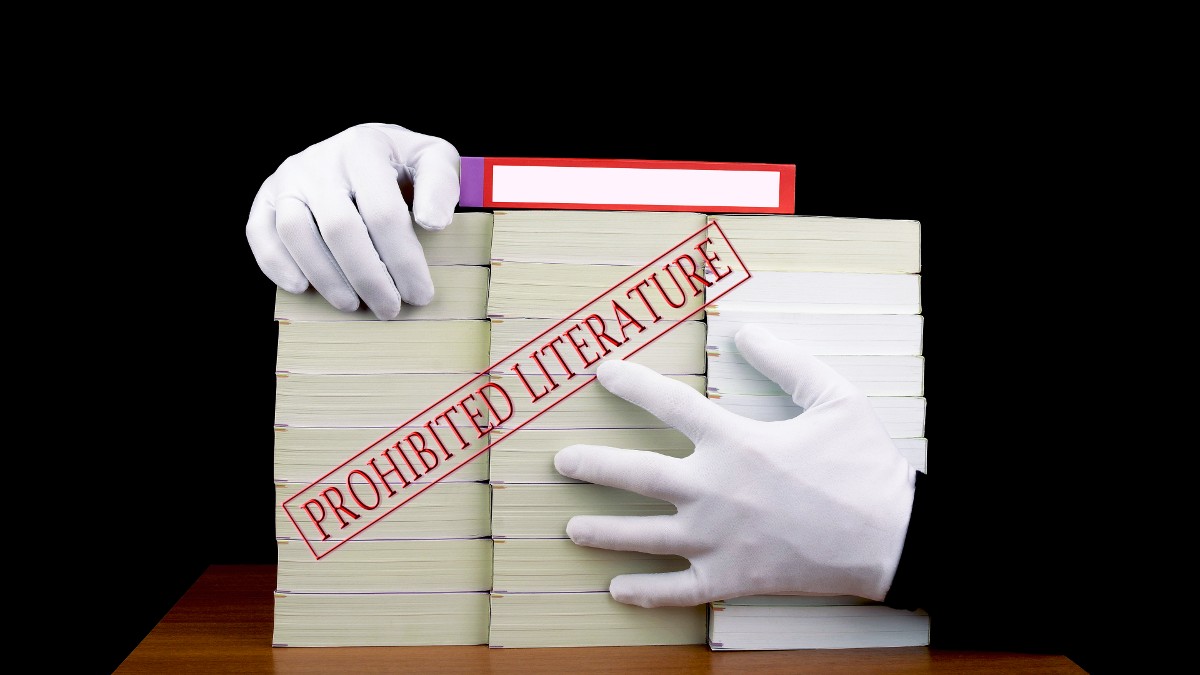Utah Emulates ‘Fahrenheit 451’ With Statewide Book Bans and Calls for Book Burnings

Utah is emulating Farhenheit 451 as it becomes the first state to enforce statewide book bans and almost issued an order for schools to physically destroy the books banned statewide.
Book bans have been skyrocketing across the country lately as conservative parents and politicians push for censorship of any books that don’t fit the right-wing agenda. Books that tackle race, LGBTQ topics, or women’s issues are most commonly targeted. In Republican states, legislators have begun signing book-banning laws, which threaten hefty fines and even prison time for teachers or librarians who don’t adhere to the censorship guidelines. Often, these laws include purposefully vague language to allow parents and politicians to abuse the law and successfully ban or remove any book by falsely labeling it “obscene” or “sexually explicit.”
While these laws can make it much easier to ban books, it is usually individual school districts that form lists of banned books to enforce locally. Now, though, Utah has passed a law that will allow the state to create a list of books that will be banned in every single public school across the state.
Utah prepares for statewide book-banning law to take effect
Utah recently passed House Bill 29, which grants school boards the right to ban books statewide under certain conditions. For a book to be banned statewide, at least three school districts, or two school districts and five charter schools, must find that a book amounts to “objective sensitive material.” The process requires each school district to evaluate potentially questionable books and label them as either “subjective” or “objective” sensitive material. For the material to meet the objective standard, it must meet the state’s definition of “pornography” and “indecency.”
Books can be considered “harmful” without necessarily meeting the definition of pornography. In this case, they would be deemed “subjective” and would be removed from the school district that evaluated them but wouldn’t be removed statewide. All it takes, though, is three school districts to deem a book “objective sensitive material,” and it will be banned statewide. The law will go into effect on July 1, and schools will have 30 days from that date to turn in their reports on which books are subjective or objective sensitive material.
For context, Utah has 41 school districts and over 100 charter schools. Each of these districts is being given a short time frame to evaluate their books and send in lists of those they believe qualify as objective or subjective sensitive material. According to the Instructional Materials Guidance Document sent to schools, only two school board members are required to make the initial determination of objective or subjective sensitive materials before the book goes through a review process to confirm the rating. So, theoretically, if six people in Utah decide a book they dislike is objective sensitive material and their decision stands, the book can be pulled from all 41 school districts and 100+ charter schools servicing roughly 675,000 students.
These initial lists of subjective or objective sensitive material will be submitted to the Utah State Board of Education (USBE), which can intervene to prevent a book with three objective sensitive material reports from being banned statewide. However, the board will only have 30 days after a book meets the statewide ban requirements to hold a hearing on the book and vote to overturn the ban. If it misses that deadline, the statewide ban stands and is permanent. In two months, Utah will release the first list of books to be banned statewide. It is expected to include works from authors like Toni Morrison, Margaret Atwood, and Judy Blume and could span hundreds of titles.
The USBE wanted to require schools to burn banned books
Although the USBE can intervene in the school district’s decision to enact statewide bans, the chances of such intervention seem relatively small. After all, the USBE seriously considered requiring schools to not only adhere to the statewide bans, but to physically destroy any books that made the statewide ban list. Apparently, the board members feared that students would dig through the dumpsters or take other measures to access the banned books. Board member Brent Strate stated, “I don’t care if it’s shredded, burned, it has to be destroyed one way or another.”
Fortunately, one board member spoke out about the sheer absurdity of the whole conversation. Carol Lear stated:
I find it amusing that we’re going to ban books, and we’re going to burn books, and we’re going to cart them beyond the dumpster at the school because kids are so desperate to get a hold of information that they, apparently, aren’t getting from parents. I have a hard time taking this seriously. And frankly, I hope this is so bad that someone sues.
Ultimately, the board decided to direct schools to “legally dispose of” books for fear of facing repercussions for destroying government property. How the schools will interpret the order to “legally dispose of” hundreds of books is unclear.
As Lear expressed, it’s difficult to believe what’s happening in Utah is real and not the plot of some dystopian novel, as the state enacts statewide book bans and the USBE discusses the best way to physically destroy hundreds of children’s books. Additionally, we can only hope that somebody sues Utah for blatantly violating their rights and allowing a handful of conservative school board members to determine what the entire state can or cannot have access to.
Have a tip we should know? [email protected]